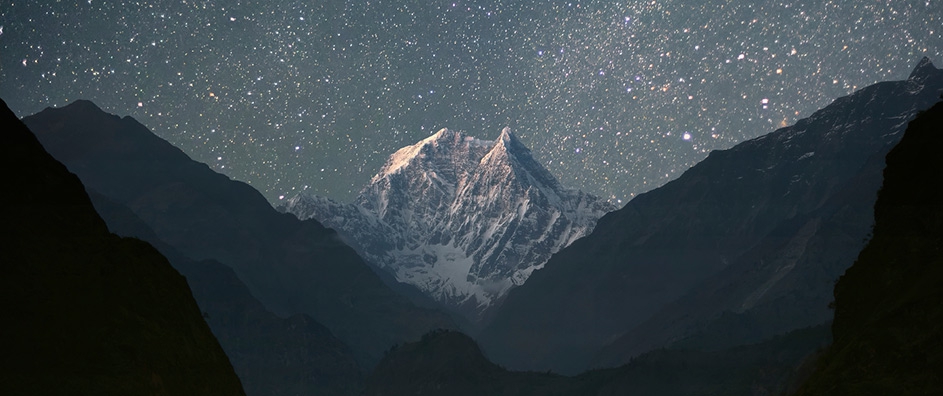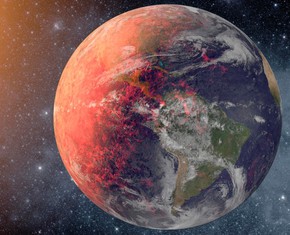The views expressed in our content reflect individual perspectives and do not represent the authoritative views of the Baha'i Faith.
If the stars should appear one night in a thousand years, how would men believe and adore; and preserve for many generations the remembrance of the city of God which had been shown! But every night come out these envoys of beauty, and light the universe with their admonishing smile. – Ralph Waldo Emerson
He was there alone with himself, collected, tranquil, adoring, comparing the serenity of his heart with the serenity of the skies, moved in the darkness by the visible splendors of the constellations, and the invisible splendor of God, opening his soul to the thoughts which fall from the Unknown. In such moments, offering up his heart at the hour when the flowers of night inhale their perfume, lighted like a lamp in the center of the starry night, expanding his soul in ecstasy in the midst of the universal radiance of creation, he could not himself perhaps have told what was passing in his own mind; he felt something depart from him, and something descend upon him, mysterious interchanges of the depths of the soul with the depths of the universe. – Victor Hugo, Les Miserables
Before we invented civilization our ancestors lived mainly in the open out under the sky. Before we devised artificial lights and atmospheric pollution and modern forms of nocturnal entertainment we watched the stars. There were practical calendar reasons of course but there was more to it than that. Even today the most jaded city dweller can be unexpectedly moved upon encountering a clear night sky studded with thousands of twinkling stars. When it happens to me after all these years it still takes my breath away. – Carl Sagan
My wife and I live in the conifer forest that carpets the Sierra Nevada foothills in northern California. With the closest big city an hour away, we don’t have much light pollution shining up into the night sky. That means, when friends from urban areas come to visit, we like to walk out into the nighttime darkness and invite them to look up. They usually gasp in wonder, because they can see many more stars than they’ve ever seen before. On a clear night, billions of stars obliterate the blackness of the sky, and turn the darkness into an illuminated dome of delight.

Carl Sagan
I’m convinced that many more people would find it easier to believe in a Creator if they could just see the night sky the way we can. With today’s normal city view of a dark, featureless sky populated by only a few dim stars, urban dwellers don’t often get to experience the majesty and beauty of the entire universe unfolding itself in front of them. As the physicist Carl Sagan suggests, perhaps indigenous, pre-artificial light cultures—which all enjoyed robust spiritual traditions and an unimpeded view of the wonders of the heavens—had a significant spiritual advantage over our modern, brightly-lit civilizations.
In this series of essays on the mysteries of the universe, we’ve explored the enormity of that infinite reach of creation. We’ve examined the meaning of an individual life in relation to the unending, timeless distances between the uncountable stars. We’ve looked out into the cosmos, and the cosmos has looked back into us. We’ve made the metaphorical comparison between the infinity of our physical universe and the much greater, unknowable infinity of God:
…God is almighty, but His greatness cannot be brought within the grasp of human limitation. We cannot limit God to a boundary. Man is limited, but the world of Divinity is unlimited. Prescribing limitation to God is human ignorance. God is the Ancient, the Almighty; His attributes are infinite. He is God because His light, His sovereignty, is infinite. If He can be limited to human ideas, He is not God. Strange it is that, notwithstanding these are self-evident truths, man continues to build walls and fences of limitation about God, about Divinity so glorious, illimitable, boundless. Consider the endless phenomena of His creation. They are infinite; the universe is infinite. Who shall declare its height, its depth and length? It is absolutely infinite. – Abdu’l-Baha, The Promulgation of Universal Peace, p. 274.
So I hope, the next time you get the chance to escape the obscuring urban penumbra of artificial light, you’ll spend some time gazing into the bright, star-filled heavens; and that your gaze will truly see the visible handiwork of the invisible Creator:
Those who believe in God and are confident in His Word shall enter the Kingdom, and the essential oneness appears among them to such an extent that all become the drops of one ocean, the rays of one sun, the fishes of one sea, the trees of one garden, the birds of one orchard, the candles of one assembly and the stars of the same heaven. – Abdu’l-Baha, Star of the West, Volume 1, p. 5.
Next: The Greatest Beauty in God’s Creation
















Comments
Sign in or create an account
Continue with Googleor